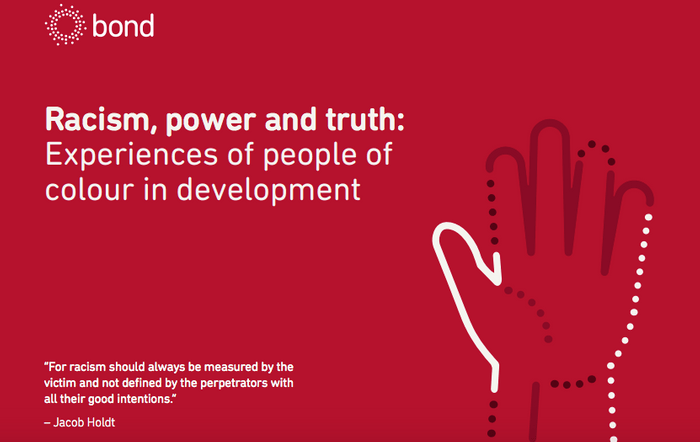
French foundations & endowments sector saw 5% growth in 2020
July 7, 2021
Romanian text & Direct Debit donations reached highest ever levels in 2020
July 7, 2021A recent survey of people of colour employed by UK NGOs has found that the vast majority feel that their organisations are not truly committed to equality, diversity, and inclusion (EDI).
International development network Bond questioned 150 people of colour for its Racism, Power & Truth report – 77% of whom were in the UK with 23% outside the UK. Overall, 90% questioned their organisation’s commitment to EDI, while 68% said that they had experienced an incident of racism in the workplace within the past year or had supported someone else who experienced a racist incident.
85% of respondents also felt that as a person of colour, getting promoted in the sector was not accessible to them, with promotion seen as a reward only accessible to people from non-minoritised groups. In addition, 65% felt they had not had equal access to mentors as their white peers.
The findings also revealed that:
– 69% did not feel they had been able to take leadership on internal initiatives as much as their white peers had
– 71% said they had fewer opportunities to represent their organisations externally than their white peers did
– 50% said they had not had the same training opportunities as their white peers
As well as including the voices and experiences of people of colour, the report also offers a number of recommendations that draw upon ongoing consultations with the Bond People of Colour in Development Group, and covering policies, systems, and culture.
Lena Bheeroo, lead author of the report and Engagement & Equity Manager at Bond, said:
“This report comes a year after the sector was invited to hold a mirror up to itself and look at the levels of representation we have in positions of power. Our report provides evidence for what we have known for many years now. Across the UK NGO sector, people of colour are underrepresented in senior roles, and that they are facing multiple barriers to career progression, with the odds stacked against them.
“For a sector that is working to champion people’s rights, fairness and equality, this is a big problem. Organisations must not shy away from speaking about racism and anti-Blackness. They have the responsibility to move beyond diversity in just HR terms, towards making better staffing decisions that better represent the countries and contexts that we work in.
“CEOs and board members should commit to sponsoring people of colour by investing time with them, opening doors, bringing them into existing networks and championing them publicly.
“On an individual level, people need to reflect on their levels of privilege and power and their position within the sector, so that they can start to take steps to disrupt the dynamics at play.”




